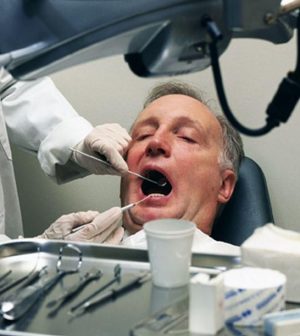- Recognizing the Signs of Hypothyroidism
- 10 Strategies to Overcome Insomnia
- Could Artificial Sweeteners Be Aging the Brain Faster?
- Techniques for Soothing Your Nervous System
- Does the Water in Your House Smell Funny? Here’s Why
- Can a Daily Dose of Apple Cider Vinegar Actually Aid Weight Loss?
- 6 Health Beverages That Can Actually Spike Your Blood Sugar
- Treatment Options for Social Anxiety Disorder
- Understanding the Connection Between Anxiety and Depression
- How Daily Prunes Can Influence Cholesterol and Inflammation
Odds of Catching COVID at Dentist’s Office Very Low: Study

Do yon need to have your teeth cleaned or a cavity filled?
Go ahead.
Dental treatment won’t put you at risk for contracting COVID-19, a new study affirms.
“Getting your teeth cleaned does not increase your risk for COVID-19 infection any more than drinking a glass of water from the dentist’s office does,” said lead author Purnima Kumar, a professor of periodontology at Ohio State University in Columbus.
Because COVID-19 spreads mostly by airborne droplets, fears have persisted throughout the pandemic that saliva released during a dental procedure could spread the virus.
For the study, Kumar’s team analyzed the genetic makeup of organisms found in air samples during a range of dental procedures.
The takeaway: Water solution from irrigation tools — not saliva — was the main source of any bacteria or viruses in the spatter and spurts from patients’ mouths.
Even when low levels of the SARS-CoV-2 virus were found in the saliva of asymptomatic patients, the aerosols generated during their dental work showed no signs of the coronavirus, the research found.
“These findings should help us open up our practices, make ourselves feel safe about our environment and, for patients, get their oral and dental problems treated — there is so much evidence emerging that if you have poor oral health, you are more susceptible to COVID,” Kumar said in a university news release.
“Hopefully this will set their mind at rest because when you do procedures, it is the water from the ultrasonic equipment that’s causing bacteria to be there. It’s not saliva. So the risk of spreading infection is not high,” Kumar said. “However, we should not lose sight of the fact that this virus spreads through aerosol, and speaking, coughing or sneezing in the dental office can still carry a high risk of disease transmission.”
The findings were published May 12 in the Journal of Dental Research.
More information
For more on COVID-19, head to the U.S. Centers for Disease Control and Prevention.
SOURCE: Ohio State University, news release, May 12, 2021
Source: HealthDay
Copyright © 2026 HealthDay. All rights reserved.










